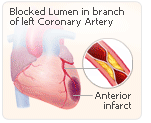
For many years research has suggested that some of the benefits of hormone replacement therapy include reduced risk of cardiovascular problems and osteoporosis in the women that take it. Some of the research surrounding this topic has shown conflicting results which show hormone replacement therapy as being detrimental to women who have already had cardiovascular problems.
In a review of the Heart and Estrogen/Progestin Replacement Study (HERS) by Dr. John Blakely results assessed so that new conclusions could be found which may help to reduce cardiovascular problems in women taking hormone replacement therapy. The original study found that in the first six months of hormone replacement therapy women going through menopause, who had already been diagnosed with coronary artery disease, had an increased risk of coronary events. As time went by the risk of cardiovascular problems were reduced in these women but the results of the first six months of the trail were surprising as hormone replacement therapy was widely thought to only improve women's coronary health during and after menopause.
Dr. Blakely, upon reviewing these findings, concluded that hormone replacement therapy was the cause of this increased risk during the first six months of treatment for women during menopause, and that the reasons why this risk had not been highlighted before was because other studies had not recognized women as being in danger during this time.

A reply to this comment by the Menopause Special Interest Group of Birmingham, Alabama, on behalf of the American Society of Reproductive Medicine disagreed with Dr. Blakely's comments. This reply suggested that this six month period was an anomaly which distracted from the rest of the results of this study, which showed that cardiovascular events were actually dramatically cut in hormone replacement therapy users during the four year follow up. This comment also highlighted the need to wait for ongoing research into the effects of hormone replacement therapy to be completed in order to find proper conclusions about this topic.
In reply to this comment, Dr. Blakely once again suggests that the results of HERS do in fact show a substantial risk to women with pre-diagnosed coronary problems. He concludes that there are two effects for women taking hormone replacement therapy during menopause, the initial, which is harmful and the later one which is positive. It is important for women to be aware of this risk before commencing hormone replacement therapy.
As these arguments conclude more research needs to be undertaken on the subject of cardiovascular problems during hormone replacement therapy use. Women who are worried about hormone replacement therapy should consult their doctor in order to receive professional medical advice on the subject and look into other possible treatment for menopausal symptoms which may present fewer risks to a woman's health than hormone replacement therapy.